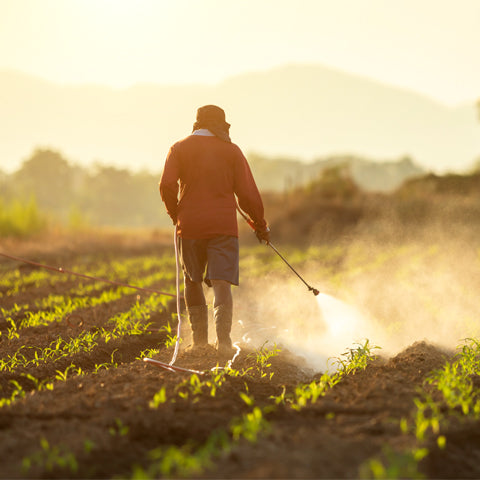If you have to choose between a perfectly red and unblemished tomato and one that is reddish-orange and slightly soft on one side, which would you pick?
While most would say the former, that may not be the best choice. This article explores why -
While we are becoming more selective about what we include in our diet as per our body requirements, what we still ignore is the source of the food we put on our table. Where are our fruits, vegetables, lentils, and grains coming from?
We know that they are tilled, sowed, and nurtured by hard-working farmers who then deliver them to our doorsteps, but what about the kind of food that is being served to our food?
Yes, we are talking about pesticides that have been used over many years to increase yield and protect crops from pests, insects, and infections.
While insects and pests harm the crops and our bodies in many ways, pesticides are peskier irritants that not only climb up the food chain, but also seep into water streams thus polluting drinking water and fish, making its way to our immune system, causing more harm than good. For the agricultural sector, pesticides are a straightforward solution to combating destruction of crops and insect related diseases like malaria and typhoid. However, recent data shows that the use of these pesticides cause more harm to us and the environment than it helps.
The following are some myths and facts about pesticides that we hope will make us more conscious of where we source our food from -
Myth #1: Pesticides don’t impact human health.
Busted: Pesticides by nature are designed to harm and kill pests that infect plants. They are inherently harmful in nature and when consumed for long have been found to impact immune and nervous systems in both children and adults, putting cerebral and physical development at risk.
Myth #2: Low doses of pesticides pose little health problems
Busted: Many times small doses of medicines are cures for big ailments and administering them intermittently is considered good practice. Unfortunately, this doesn’t hold true for pesticides. It is not the low dose, but the compounds created when chemicals, pesticides, and insecticides are mixed, that can result in endocrine and hormonal fluctuations.
Myth #3: It is a foolproof solution with 100% effectiveness against insects and bugs.
Busted: Pesticides were popularized because of a chemical mixture called DDT that prevented humans from malaria, typhoid, and other diseases. However, DDT has recently been proven ineffective against the swarms of bugs that have grown immune to it and so has been banned in many regions all over the world.
Myth #4: Pesticides only impact the plant insects, not the farmers who grow the plants.
Busted: Pesticides pose higher health problems for those in the production line, making it unsafe for the farmers, factory officials, formulators, and sprayers who come in close contact with the chemicals.
Myth #5: Pesticides enhance soil health by making it insect-free.
Busted: The chemicals in pesticides cause adverse long-term impact to the quality of soil, often making the fields barren. They climb up the food chain and affect animals that are not directly consuming the crops. Rodents on the field eat the grain and are in turn eaten by larger birds or animals who also feel the repercussions of the chemicals. Furthermore, these chemicals infect water streams and affect the air quality as the soil gets washed off under taps or disperse into the air at the time of spraying.
Now that we are more conscious about the harmful effects of pesticides, we as consumers have the power to create substantial change in the production and marketing chains. By shifting towards more organic, naturally produced products as opposed to chemically supported ones, we can voice our demand against pesticides. Doing this will encourage and help agriculturists grow more organic crops, and contribute towards the rejuvenation and care of our planet and our bodies. Supporting the farmers is a way of supporting the earth and environment. Every click on organic food products can contribute towards saving a larger ecosystem and creating impactful change.
At Conscious Food, we take care to deliver the most wholesome, organic, and pesticide-free food at your doorstep. Together, we promote the work of famers who tend to the soil with love and respect. Credited by NOCA, we hope to be pioneers in promoting chemical-free food that nourishes the environment and her people. Our range of organic pulses and grains are sourced from regions where they receive the best natural growth support! So make a choice against pests and towards pure produce!
Written by Sakshi Agarwal (Weloquent)






